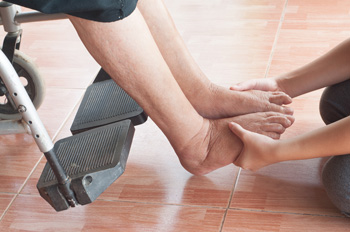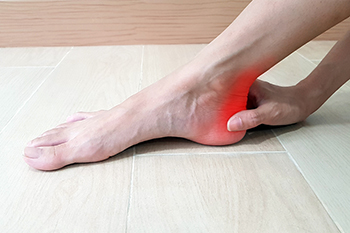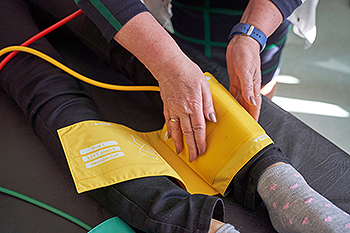Items filtered by date: March 2022
The Benefits of Wearing Flip Flops
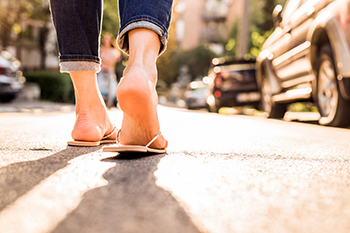 Many people enjoy wearing flip flops for their various colors and simplicity. There are benefits that avid flip flop wearers recognize, including their versatility, comfort, and relaxing qualities. Additionally, they allow the feet to breathe, and the toes typically have adequate room to wiggle in. They are easy to wear for their lack of laces, and can be good for children who have not learned how to tie shoes. There are some flip flops that are designed with an arch, in addition to being made of comfortable material. Many people enjoy wearing them to the beach, pool, or performing local errands. Of course, while there are benefits there can also be risks, such as blisters. Staggering how often you wear them can help avoid this. If you would like to learn about how wearing flip flops may be good for your feet, a podiatrist can provide you with the necessary information.
Many people enjoy wearing flip flops for their various colors and simplicity. There are benefits that avid flip flop wearers recognize, including their versatility, comfort, and relaxing qualities. Additionally, they allow the feet to breathe, and the toes typically have adequate room to wiggle in. They are easy to wear for their lack of laces, and can be good for children who have not learned how to tie shoes. There are some flip flops that are designed with an arch, in addition to being made of comfortable material. Many people enjoy wearing them to the beach, pool, or performing local errands. Of course, while there are benefits there can also be risks, such as blisters. Staggering how often you wear them can help avoid this. If you would like to learn about how wearing flip flops may be good for your feet, a podiatrist can provide you with the necessary information.
Flip-flops can cause a lot of problems for your feet. If you have any concerns about your feet or ankles, contact the foot specialists from Table Mountain Foot and Ankle. Our doctors will assist you with all of your foot and ankle needs.
Flip-Flops and Feet
Flip-flops have managed to become a summer essential for a lot of people. While the shoes may be stylish and easy to slip on and off, they can be dangerous to those who wear them too often. These shoes might protect you from fungal infections such as athlete’s foot, but they can also give you foot pain and sprained ankles if you trip while wearing them.
When Are They Okay to Wear?
Flip-flops should only be worn for very short periods of time. They can help protect your feet in places that are crawling with fungi, such as gym locker rooms. Athlete’s foot and plantar warts are two common fungi that flip-flops may help protect your feet against.
Why Are They Bad for My Feet?
These shoes do not offer any arch support, so they are not ideal for everyday use. They also do not provide shock absorption or heel cushioning which can be problematic for your feet. Additionally, you may suffer from glass cuts, puncture wounds, and stubbed toes since they offer little protection for your feet.
More Reasons Why They Are Bad for Your Feet
- They Slow You Down
- May Cause Blisters and Calluses
- Expose Your Feet to Bacteria
If you have any questions, please feel free to contact our office located in Wheat Ridge, CO . We offer the newest diagnostic and treatment technologies for all your foot care needs.
Simple Foot Care Can Help Maintain Mobility
Keeping your feet as healthy as possible through proper foot care can help you maintain your mobility into old age. Your body weight plays a big role in your foot health, and the pounds can add up as we age. This extra weight not only places more strain on your feet, but makes you more susceptible to developing conditions such as arthritis, diabetes, and circulatory issues that affect the feet. So, it is important to do all you can to reach and maintain your ideal weight. Doing simple things like keeping your feet clean, dry, and moisturized can help prevent conditions such as calluses, cracked heels, and more. Keeping your toenails trimmed straight across, but not so short that they grow into surrounding skin, will help prevent ingrown toenails. Wearing supportive footwear that fits well is another important component to protecting your feet and maintaining your mobility. Stretching your feet and Achilles tendon will keep your feet, ankles, muscles and connective tissues flexible and strong. Getting your feet checked regularly by a podiatrist will help keep your feet healthy and also allow you to gain more knowledge about how to improve and maintain your mobility.
Everyday foot care is very important to prevent infection and other foot ailments. If you need your feet checked, contact the foot specialists from Table Mountain Foot and Ankle. Our doctors can provide the care you need to keep you pain-free and on your feet.
Everyday Foot Care
Often, people take care of their bodies, face and hair more so than they do for their feet. But the feet are a very important aspect of our bodies, and one that we should pay more attention to. Without our feet, we would not be able to perform most daily tasks.
It is best to check your feet regularly to make sure there are no new bruises or cuts that you may not have noticed before. For dry feet, moisturizer can easily be a remedy and can be applied as often as necessary to the affected areas. Wearing shoes that fit well can also help you maintain good foot health, as well as making it easier to walk and do daily activities without the stress or pain of ill-fitting shoes, high heels, or even flip flops. Wearing clean socks with closed shoes is important to ensure that sweat and bacteria do not accumulate within the shoe. Clean socks help to prevent Athlete’s foot, fungi problems, bad odors, and can absorb sweat.
If you have any questions please feel free to contact our office located in Wheat Ridge, CO . We offer the newest diagnostic and treatment technologies for all your foot and ankle needs.
When the Back of Your Heel Is Painful
Pain behind the heel, known as posterior heel pain, can be caused by several conditions. Achilles’ tendonitis is an inflammation of the tendon that attaches to the back of the heel. The inflammation may be caused by tears or calcium deposits within the tendon. A bone spur that develops at the back of the heel bone (nicknamed “pump bump”) can irritate surrounding tissue and become painful rubbing against footwear. Retrocalcaneal bursitis is an inflammation of the cushioning bursa sac between the back of the heel and the Achilles tendon. Other possible causes of posterior heel pain include stress fractures in the heel bone, an inflammation of the plantar fascia tissue on the sole of the foot (plantar fasciitis), and compression and inflammation of a small, extra bone some people have in their ankle (os trigonum syndrome). If you have any pain in the back of your heel, it is suggested that you get your condition diagnosed and treated by a podiatrist.
Many people suffer from bouts of heel pain. For more information, contact the foot specialists of Table Mountain Foot and Ankle. Our doctors can provide the care you need to keep you pain-free and on your feet.
Causes of Heel Pain
Heel pain is often associated with plantar fasciitis. The plantar fascia is a band of tissues that extends along the bottom of the foot. A rip or tear in this ligament can cause inflammation of the tissue.
Achilles tendonitis is another cause of heel pain. Inflammation of the Achilles tendon will cause pain from fractures and muscle tearing. Lack of flexibility is also another symptom.
Heel spurs are another cause of pain. When the tissues of the plantar fascia undergo a great deal of stress, it can lead to ligament separation from the heel bone, causing heel spurs.
Why Might Heel Pain Occur?
- Wearing ill-fitting shoes
- Wearing non-supportive shoes
- Weight change
- Excessive running
Treatments
Heel pain should be treated as soon as possible for immediate results. Keeping your feet in a stress-free environment will help. If you suffer from Achilles tendonitis or plantar fasciitis, applying ice will reduce the swelling. Stretching before an exercise like running will help the muscles. Using all these tips will help make heel pain a condition of the past.
If you have any questions please contact our office located in Wheat Ridge, CO . We offer the newest diagnostic and treatment technologies for all your foot and ankle needs.
What to Do When Your Feet Are Burning
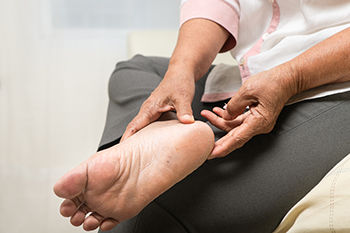 The sensation that your feet are uncomfortably hot and painful is commonly known as BFS, or burning feet syndrome. It is more common in the elderly, and the sensation is especially active at night. BFS can target both the sole and the top of your feet, as well as your ankles and legs. One of the main causes of BFS is diabetes, but others include heavy alcohol use, Charcot-Marie-Tooth disease (damage to peripheral nerves), and tarsal tunnel syndrome (nerve damage in the ankle). Depending on the underlying cause and the seriousness of the ailment, several home remedies may help. Among them are soaking your feet in cold water, in warm water with Epsom salts, or in apple cider vinegar; taking fish oil supplements; massaging with ginger oil; and applying numbing creams or patches to the affected area. A note of caution: If you are experiencing continuous burning feet syndrome, it is a good idea to visit a podiatrist who can assess the severity of your condition and offer further treatment options.
The sensation that your feet are uncomfortably hot and painful is commonly known as BFS, or burning feet syndrome. It is more common in the elderly, and the sensation is especially active at night. BFS can target both the sole and the top of your feet, as well as your ankles and legs. One of the main causes of BFS is diabetes, but others include heavy alcohol use, Charcot-Marie-Tooth disease (damage to peripheral nerves), and tarsal tunnel syndrome (nerve damage in the ankle). Depending on the underlying cause and the seriousness of the ailment, several home remedies may help. Among them are soaking your feet in cold water, in warm water with Epsom salts, or in apple cider vinegar; taking fish oil supplements; massaging with ginger oil; and applying numbing creams or patches to the affected area. A note of caution: If you are experiencing continuous burning feet syndrome, it is a good idea to visit a podiatrist who can assess the severity of your condition and offer further treatment options.
Proper foot care is something many older adults forget to consider. If you have any concerns about your feet and ankles, contact the foot specialists from Table Mountain Foot and Ankle. Our doctors can provide the care you need to keep you pain-free and on your feet.
The Elderly and Their Feet
As we age we start to notice many changes in our body, but the elder population may not notice them right away. Medical conditions may prevent the elderly to take notice of their foot health right away. Poor vision is a lead contributor to not taking action for the elderly.
Common Conditions
- Neuropathy – can reduce feeling in the feet and can hide many life-threatening medical conditions.
- Reduced flexibility – prevents the ability of proper toenail trimming, and foot cleaning. If left untreated, it may lead to further medical issues.
- Foot sores – amongst the older population can be serious before they are discovered. Some of the problematic conditions they may face are:
- Gouging toenails affecting nearby toe
- Shoes that don’t fit properly
- Pressure sores
- Loss of circulation in legs & feet
- Edema & swelling of feet and ankles
Susceptible Infections
Diabetes and poor circulation can cause general loss of sensitivity over the years, turning a simple cut into a serious issue.
If you have any questions please feel free to contact our office located in Wheat Ridge, CO . We offer the newest diagnostic and treatment technologies for all your foot and ankle needs.
Are Bunions Affecting Your Everyday Life?
Why Are My Feet Tingling?
Peripheral neuropathy causes damage to the nerves outside of the spinal cord and brain, which can result in a host of symptoms, starting in the feet. You may have peripheral neuropathy if you feel tingling or pins and needles in your feet. You may also experience stabbing, shooting, or burning pain in your feet, which tends to be worse in the evening. Your feet may feel numb, weak, or “dead.” They may even be so sensitive that the bed sheets brushing against your feet causes pain. You may have difficulty sensing temperature in your feet, or you may get the sensation of wearing socks even if you are barefoot. In some cases, you may develop ulcers (open wounds) on your feet or legs. While there is no cure for nerve damage, you can help prevent the condition from worsening by keeping blood glucose levels in target range. A podiatrist can also help you keep your feet and legs as healthy as possible and help manage the pain and discomfort caused by peripheral neuropathy.
Peripheral artery disease can pose a serious risk to your health. It can increase the risk of stroke and heart attack. If you have symptoms of peripheral artery disease, consult with the foot specialists from Table Mountain Foot and Ankle. Our doctors will assess your condition and provide you with quality foot and ankle treatment.
Peripheral artery disease (PAD) is when arteries are constricted due to plaque (fatty deposits) build-up. This results in less blood flow to the legs and other extremities. The main cause of PAD is atherosclerosis, in which plaque builds up in the arteries.
Symptoms
Symptoms of PAD include:
- Claudication (leg pain from walking)
- Numbness in legs
- Decrease in growth of leg hair and toenails
- Paleness of the skin
- Erectile dysfunction
- Sores and wounds on legs and feet that won’t heal
- Coldness in one leg
It is important to note that a majority of individuals never show any symptoms of PAD.
Diagnosis
While PAD occurs in the legs and arteries, Podiatrists can diagnose PAD. Podiatrists utilize a test called an ankle-brachial index (ABI). An ABI test compares blood pressure in your arm to you ankle to see if any abnormality occurs. Ultrasound and imaging devices may also be used.
Treatment
Fortunately, lifestyle changes such as maintaining a healthy diet, exercising, managing cholesterol and blood sugar levels, and quitting smoking, can all treat PAD. Medications that prevent clots from occurring can be prescribed. Finally, in some cases, surgery may be recommended.
If you have any questions, please feel free to contact our office located in Wheat Ridge, CO . We offer the newest diagnostic and treatment technologies for all your foot care needs.
